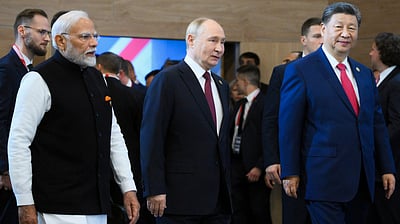In a sharp escalation of the United States’ pressure campaign against Russia and its allies, Senator Lindsey Graham (R‑SC) has introduced sweeping new sanctions legislation that targets not only Moscow, but also countries such as India, China, and Iran for continuing economic ties with Russia amid the ongoing war in Ukraine.
The bipartisan bill, co-sponsored with Senator Richard Blumenthal (D‑CT), is officially titled the Sanctioning Russia Act of 2025 and is being described by Graham as an “economic bunker buster.” Its aim: to forcefully curtail Russia’s ability to finance its war through the sale of energy and other exports.
“If you’re buying Russian oil and gas, you’re financing the war effort,” Graham said in a recent interview. “This bill would impose tariffs and secondary sanctions on countries that are helping keep Putin’s economy afloat.”
Key Provisions
The proposed legislation introduces unprecedented economic measures:
A 500% tariff on imports from any nation that continues to buy Russian oil, natural gas, coal, or uranium.
Secondary sanctions on foreign companies and governments that facilitate trade with Russia in sanctioned sectors.
Automatic triggers for sanctions if Russia refuses good-faith negotiations or violates ceasefire terms.
These measures are designed to isolate Russia economically while compelling countries like India and China—currently among the largest purchasers of Russian energy—to reevaluate their positions.
India and China in the Crosshairs
Together, India and China account for roughly 70% of Russia’s current energy exports, according to trade data cited by U.S. lawmakers. Both countries have resisted Western pressure to cut ties with Moscow, arguing that their energy deals are based on national interest and economic necessity.
But Graham had a warning: “If you want to do business with the United States, don’t finance Putin’s war machine. If you keep buying cheap Russian oil, you’re going to lose access to our markets.”
This threat is especially significant for India and China, which enjoy massive trade surpluses with the U.S. A 500% tariff could severely disrupt key sectors such as electronics, pharmaceuticals, and consumer goods.
The bill has garnered broad bipartisan backing in Congress, with over 80 senators reportedly supporting it—enough to overcome a filibuster and potentially override a presidential veto. A companion bill in the House, introduced by Rep. Brian Fitzpatrick (R‑PA), has also gained traction.
The Senate is expected to vote on the bill in the coming weeks, possibly aligning the timing with international events such as the G7 summit.
White House Caution
The Biden administration has expressed interest in shaping the legislation but is reportedly seeking waivers and carve-outs to maintain diplomatic flexibility—particularly in managing relations with India and other strategic partners.
Graham has suggested he’s open to amendments that could exempt countries that provide meaningful support to Ukraine or reduce their reliance on Russian energy.
If enacted, the sanctions could dramatically reshape global trade, driving a wedge between the U.S. and key economic partners, while increasing inflationary pressures and supply chain disruptions.
Critics warn the bill could provoke retaliatory measures and damage relations with emerging powers, while supporters argue it’s a necessary step to pressure Russia and bring a swifter end to the war in Ukraine.
“Time is not on Ukraine’s side,” said US senator Blumenthal. “We need to break the financial back of Russia’s war effort before it’s too late.”
A 500% tariff on Indian exports to the U.S.—a major trade partner could create significant economic strain, particularly in sectors like pharmaceuticals, textiles, and IT services.
China, already engaged in a trade war and tech decoupling with the U.S., would likely view the bill as a direct provocation and part of broader economic containment.
Senator Graham’s “economic bunker buster” bill signals a bold, high-stakes shift in U.S. strategy—targeting not only Russia, but also the broader global network. The move will however jeopardize global trade massively as India and China are two of the most populous countries in the world with tremendous production capabilities. This move will hamper not only the US but the global economy as well.








